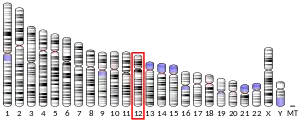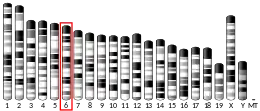GDF3
Growth differentiation factor-3 (GDF3), also known as Vg-related gene 2 (Vgr-2) is protein that in humans is encoded by the GDF3 gene.[5] GDF3 belongs to the transforming growth factor beta (TGF-β) superfamily. It has high similarity to other TGF-β superfamily members including Vg1 (found in frogs) and GDF1.[5]
Tissue distribution
Expression of GDF3 occurs in ossifying bone during embryonic development and in the brain, thymus, spleen, bone marrow and adipose tissue of adults.[6][7]
Function
GDF3 is a bi-functional protein that has some intrinsic activity and also modulate other TGF-β superfamily members, e.g. potentiates the activity of NODAL. It may also inhibit other TGF-β superfamily members (i.e. BMPs), thus regulating the balance between different modes of TGF-beta signaling.[8] It has been shown to negatively and positively control differentiation of embryonic stem cells in mice and humans.[9] This molecule plays a role in mesoderm and definitive endoderm formation during the pre-gastrulation stages of development.[6]
References
- GRCh38: Ensembl release 89: ENSG00000184344 - Ensembl, May 2017
- GRCm38: Ensembl release 89: ENSMUSG00000030117 - Ensembl, May 2017
- "Human PubMed Reference:". National Center for Biotechnology Information, U.S. National Library of Medicine.
- "Mouse PubMed Reference:". National Center for Biotechnology Information, U.S. National Library of Medicine.
- Caricasole AA, van Schaik RH, Zeinstra LM, Wierikx CD, van Gurp RJ, van den Pol M, Looijenga LH, Oosterhuis JW, Pera MF, Ward A, de Bruijn D, Kramer P, de Jong FH, van den Eijnden-van Raaij AJ (January 1998). "Human growth-differentiation factor 3 (hGDF3): developmental regulation in human teratocarcinoma cell lines and expression in primary testicular germ cell tumours". Oncogene. 16 (1): 95–103. doi:10.1038/sj.onc.1201515. PMID 9467948.
- Chen C, Ware SM, Sato A, Houston-Hawkins DE, Habas R, Matzuk MM, Shen MM, Brown CW (January 2006). "The Vg1-related protein Gdf3 acts in a Nodal signaling pathway in the pre-gastrulation mouse embryo". Development. 133 (2): 319–29. doi:10.1242/dev.02210. PMID 16368929.
- Hexige S, Guo J, Ma L, Sun Y, Liu X, Ma L, Yan X, Li Z, Yu L (December 2005). "Expression pattern of growth/differentiation factor 3 in human and murine cerebral cortex, hippocampus as well as cerebellum". Neurosci. Lett. 389 (2): 83–7. doi:10.1016/j.neulet.2005.06.071. PMID 16126341. S2CID 25293256.
- Levine A, Brivanlou A (2006). "GDF3 at the crossroads of TGF-beta signaling". Cell Cycle. 5 (10): 1069–73. doi:10.4161/cc.5.10.2771. PMID 16721050.
- Levine A, Brivanlou A (2006). "GDF3, a BMP inhibitor, regulates cell fate in stem cells and early embryos". Development. 133 (2): 209–16. doi:10.1242/dev.02192. PMID 16339188.
Further reading
- Davila S, Froeling FE, Tan A, et al. (2010). "New genetic associations detected in a host response study to hepatitis B vaccine". Genes Immun. 11 (3): 232–8. doi:10.1038/gene.2010.1. PMID 20237496.
- McPherron AC, Lee SJ (1993). "GDF-3 and GDF-9: two new members of the transforming growth factor-beta superfamily containing a novel pattern of cysteines". J. Biol. Chem. 268 (5): 3444–9. PMID 8429021.
- Levine AJ, Brivanlou AH (2006). "GDF3, a BMP inhibitor, regulates cell fate in stem cells and early embryos". Development. 133 (2): 209–16. doi:10.1242/dev.02192. PMID 16339188.
- Ye M, Berry-Wynne KM, Asai-Coakwell M, et al. (2010). "Mutation of the bone morphogenetic protein GDF3 causes ocular and skeletal anomalies". Hum. Mol. Genet. 19 (2): 287–98. doi:10.1093/hmg/ddp496. PMID 19864492.
- Gerhard DS, Wagner L, Feingold EA, et al. (2004). "The status, quality, and expansion of the NIH full-length cDNA project: the Mammalian Gene Collection (MGC)". Genome Res. 14 (10B): 2121–7. doi:10.1101/gr.2596504. PMC 528928. PMID 15489334.
- Ducy P, Karsenty G (2000). "The family of bone morphogenetic proteins". Kidney Int. 57 (6): 2207–14. doi:10.1046/j.1523-1755.2000.00081.x. PMID 10844590.
- Gopalan A, Dhall D, Olgac S, et al. (2009). "Testicular mixed germ cell tumors: a morphological and immunohistochemical study using stem cell markers, OCT3/4, SOX2 and GDF3, with emphasis on morphologically difficult-to-classify areas". Mod. Pathol. 22 (8): 1066–74. doi:10.1038/modpathol.2009.66. PMID 19396148.
- Clark HF, Gurney AL, Abaya E, et al. (2003). "The secreted protein discovery initiative (SPDI), a large-scale effort to identify novel human secreted and transmembrane proteins: a bioinformatics assessment". Genome Res. 13 (10): 2265–70. doi:10.1101/gr.1293003. PMC 403697. PMID 12975309.
- Strausberg RL, Feingold EA, Grouse LH, et al. (2002). "Generation and initial analysis of more than 15,000 full-length human and mouse cDNA sequences". Proc. Natl. Acad. Sci. U.S.A. 99 (26): 16899–903. doi:10.1073/pnas.242603899. PMC 139241. PMID 12477932.
- Andersson O, Korach-Andre M, Reissmann E, et al. (2008). "Growth/differentiation factor 3 signals through ALK7 and regulates accumulation of adipose tissue and diet-induced obesity". Proc. Natl. Acad. Sci. U.S.A. 105 (20): 7252–6. doi:10.1073/pnas.0800272105. PMC 2438236. PMID 18480259.
- Levine AJ, Levine ZJ, Brivanlou AH (2009). "GDF3 is a BMP inhibitor that can activate Nodal signaling only at very high doses". Dev. Biol. 325 (1): 43–8. doi:10.1016/j.ydbio.2008.09.006. PMC 3740937. PMID 18823971.



